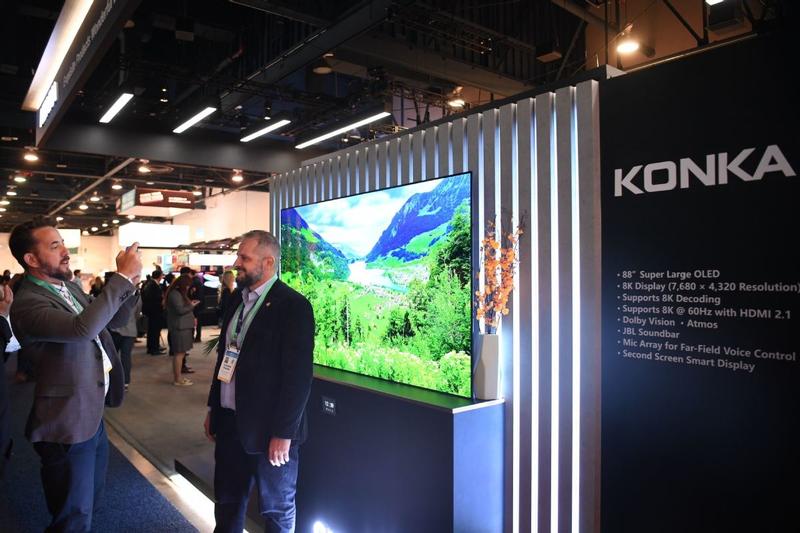 A visitor checks out a Konka 8K Micro LED display during the Consumer Electronics Show 2020 in Las Vegas, the United States, on Jan 7. (PHOTO / XINHUA)
A visitor checks out a Konka 8K Micro LED display during the Consumer Electronics Show 2020 in Las Vegas, the United States, on Jan 7. (PHOTO / XINHUA)
Marching into overseas markets has become a new profit growth point for Chinese home appliance companies due to the saturation of the local market and increasing costs of labor, logistics and raw materials, industry insiders said.
Expansion into overseas markets could not only relieve the pressure of high inventory in the domestic market but increase the international influence of Chinese home appliance companies.
Dong Min, an independent researcher in the home appliances sector
They said overseas branches or production bases not only brings China's advanced manufacturing, research and development, and management capabilities to overseas markets, but create job opportunities for local people, boost brand awareness, and enhance the competitiveness of Chinese enterprises in a global market.
Chinese television manufacturer Konka Group Co Ltd has announced plans to establish a branch company in Southern California in the United States this year in a bid to further tap the North American market and accelerate global expansion.
The new branch will focus on its own brand business-color TV sets-before expanding to other businesses such as smart home appliances. It plans to sell one million home appliances in the US by 2022.
ALSO READ: China's home appliance sector expands in H1
"Our products have entered the North American market. But this time, we will re-enter the market as a brand," Zhou Bin, president of Konka, said during the Consumer Electronics Show (CES) 2020 held in Las Vegas. He added the company will hire local staff to speed up its globalization push.
Konka has showcased its latest products-Smart Wall, which uses the cutting-edge Micro LED technology at this year's CES, as well as other advanced display products such as 8K OLED TV, 8K Mini LED TV and a series of high-tech smart home products.
Konka has recently stepped up its pace of global expansion. In August 2019, the company set up a joint venture in Egypt, and established a complete supply chain system to facilitate the firm's expansion into Africa, the Middle East, Europe and the US.
It is committed to developing technological innovations outside the home market with an incubator. To date, the incubator has established 15 innovation bases in seven Chinese cities and five foreign countries, gathering top talents around the world.
Beijing-based consultancy All View Cloud said TV sales reached 22 million units nationwide in the first half of this year, down 2.7 percent compared with the same period last year, and related sales revenue totaled 64 billion yuan, a fall of 11.8 percent year-on-year.
The competition in the domestic home appliance market is fierce, and the price decline of major TV products has resulted in a decreasing profit margin and increasing pressure on enterprises, said Zhu Yuanyuan, head of the electronic products division at AVC.
The traditional TV market is almost saturated and companies need to seek new growth points, said Dong Min, an independent researcher in the home appliances sector.
"Expansion into overseas markets could not only relieve the pressure of high inventory in the domestic market but increase the international influence of Chinese home appliance companies," Dong explained.
TCL Technology Group Corp, another Chinese home appliance maker, is stepping up efforts to expand its presence in North America through the export of its advanced manufacturing technologies, and by boosting the production capacity of large-sized products in its Mexico factory.
In 2014, TCL bought Sanyo's TV assembly factory in Mexico for the final assembly of products to be sold in the North American market. The factory could make 3.5 million TV units annually. It has about 1,590 employees, most of whom are Mexican.
 An attendee poses for photographs at Konka's booth during the CES in Las Vegas, the United States, on Jan 7. (PHOTO / XINHUA)
An attendee poses for photographs at Konka's booth during the CES in Las Vegas, the United States, on Jan 7. (PHOTO / XINHUA)
In order to cope with trade frictions between China and US, He Daoqing, deputy general manager of the Mexico factory under the TCL Electronics overseas manufacturing center, said the company added three production lines that mainly produce large-sized TVs in the second half of last year.
The sales of TCL color TV products increased 30 percent in North America last year, driven by the continued investments in brand marketing, expansion of retail channels and communication with local users, said Wu Yuji, vice-president of TCL Electronics and general manager of TCL Holdings' intelligent terminal business group (overseas) marketing headquarters.
He added TCL will launch large-sized 65-inch, 75-inch and 85-inch 8K TVs in the North American market this year. During the CES 2020, the company unveiled for the first time a next-generation display technology called Mini-LED, which delivers exceptional contrast and powerfully brilliant luminance.
"We believe that Mini-LED technology will shape the near future of the industry and TCL has pioneered in applying this technology to TVs," said Kevin Wang, CEO of TCL Industrial Holdings and TCL Electronics.
Apart from North America, TCL is expanding in emerging markets such as India, Southeast Asia and South America. The Huizhou, Guangdong province-based TCL began construction of its first-ever smart integrated manufacturing industrial park in Tirupati, India, in December 2018.
It also commenced construction of its new integrated manufacturing base in Vietnam last year. A report by research firm Sigmaintell said TCL ranked second globally in terms of TV shipment volume in the first half of 2019, next only to Samsung.
China exported 97 million TV sets in 2018, up 21 percent, said Peng Jianfeng, deputy secretary general of the China Video Industry Network.
Liang Zhenpeng, a consumer electronics analyst, said the growth rate in the domestic home appliance market is dropping so major players should accelerate steps to expand in overseas markets such as North America and South America, Africa and Europe as they continue to show huge growth potential in low, medium and high-end products.
Chinese electronics giant Hisense Group reported the global sales of its TVs reached over 20 million in 2019, ranking first in the domestic market, along with the South African and Australian markets, said Lin Lan, vice-president of the Hisense Group.
It has set a global sales goal of 40 million units within the next three years, which would rank it among the top two in the world. The revenue from overseas markets rose 20 percent year-on-year last year, the Hisense official said.
Lin noted the company has expanded the production capacity in its Mexico factory given the complex trade environment, with 4 million units of TVs being made each year. An additional 1 million fridges and kitchen appliances will go into production next year in this factory.
In 2015, Hisense purchased Sharp's TV business in Mexico and acquired Sharp America's TV line for the North and South American markets. It acquired a 95-percent stake in Japan's Toshiba Visual Solutions Corporation as part of its efforts to expand globally in 2017.
In August 2018, the Qingdao, Shandong province-based company completed the acquisition of Slovenian appliances producer Gorenje.
READ MORE: Upgrading, rural shoppers lift China's home appliance sector
So far, Hisense has established 54 overseas branches in Europe, the Americas, Africa, the Middle East, Australia and Southeast Asia. It has five overseas production bases to ensure it has its own supply chain and 12 research and development institutions worldwide.
"In the past, most of the Chinese enterprises adopted the OEM or original equipment manufacturer model, but nowadays they tend to build up their own brands to participate in global competition," Liang said.
He added establishing factories in Mexico will help Chinese enterprises avoid trade barriers brought about by US-China trade frictions and speed up localization efforts.


